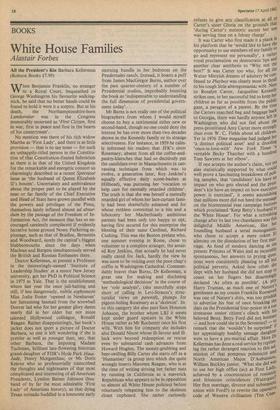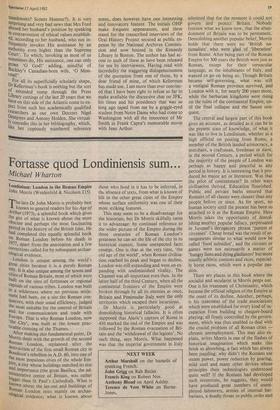BOOKS
White House Families
Alastair Forbes
All the President's Kin Barbara Kellerman (Robson Books £7.95)
when Benjamin Franklin, no stranger to a Royal Court, bequeathed to George Washington his favourite walking- stick, he said that no better hands could be found to hold it were it a sceptre. But at his death, the Northamptonshire-born Landesvater was in the Congress memorably mourned as 'First Citizen, first in war, first in peace and first in the hearts of his countrymen'.
No mention was there of his rich widow Martha as 'First Lady', and there is as little provision — that is to say none — for such an unhappily-titled person in the Constitu- tion of that Constitution-fixated federation as there is in that of the United Kingdom for the remarkable and energetic consort so charmingly described in a recent Spectator issue as 'the husband of Queen Elizabeth H's bosom'. Uncertainty and ambivalence about the proper part to be played by the near or far family of the Chief Executive and Head of State have grown parallel with the powers and privileges of the Press, themselves lately inflated almost ad absur- dum by the passage of the Freedom of In- formation Act, the measure that has so en- couraged carelessly complacent if evidently lucrative home ground Nosey Parkering es- pionage, such as that of Bradlee, Bernstein and Woodward, surely the capital's biggest blabbermouths since the days when Maclean and Burgess simultaneously served the British and Russian Embassies there.
Doctor Kellerman, at present a Professor in the interestingly-named "Institute of Leadership Studies' at a minor New Jersey university, got her PhD in Political Science in 1975 at Yale. That is the establishment where last year the once jail-baiting and still, if less dangerously, nubile sophomore Miss Jodie Foster 'opened in Newhaven' her fantasising fanmail from the screwball Denver lad who for her greater glory damn nearly did in her older but not more talented Hollywood colleague, Ronald Reagan. Rather disappointingly, her book's jacket does not sport a picture of Doctor Barbara, so one is left wondering if she is prettier as well as younger than, say, that other Barbara, the imposing Madam Tuchman, brilliant late-flowering historian grand-daughter of FDR's Hyde Park Haus- Jude, Henry Morgenthau; or Ms Doris Kearns who so professorially transcribed the thoughts and nightmares of that most complicated and interesting of all American Presidents, Lyndon Baines Johnson (hus- band of by far the most admirable 'First Lady' of American history), as that dying Texan tornado huddled in a lonesome early
morning bundle in her bedroom on the Pendernales ranch. Instead, it boasts a puff from James MacGregor Burns, author over the past quarter-century of a number of Presidential studies, improbably boosting the book as 'indispensable to understanding the full dimension of presidential govern- ment today'.
Mr Burns is not really one of the political biographers from whom I would myself choose to buy a testimonial either new or second-hand, though no one could deny the interest he has over more than two decades shown in the Kennedy family or its strange selectiveness. For instance, in 1959 he calm- ly informed his readers that JFK's sister Rosemary, absent from all the coffee-and- pastry-klatsches that had so decisively put the candidate over in Massachusetts (a can- vassing technique from which was to evolve, a generation later, Roy Jenkins's equally effective daily scone-bashes at Hillhead), was pursuing her 'vocation to help care for mentally retarded children'. The truth is that she was herself a mentally retarded girl of whom her lace-curtain fami- ly had been shamefully ashamed and for whose ruthless committal to a bin and a lobotomy her Macbethianly ambitious parents had been only too happy to opt, having first secured for this enterprise the blessing of their tame Cardinal, Richard Cushing. This was the Boston prelate who, one summer evening in Rome, chose to volunteer to a complete stranger, the amaz- ed Roy Jenkins, that actually he had never really cared for Jack, hardly the view he was soon to be voicing over the poor chap's coffin in Washington Cathedral. Commen- dably braver than Burns, Dr Kellerman, a great one for making and disclosing 'methodological decisions' in the course of her 'role analysis', (she mercifully stops short of calling in Levi-Strauss's struc- turalist views on parente), plumps for pigeon-holing Rosemary as a 'skeleton'. In- to this category she also puts Sam Houston Johnson, the brother whom LBJ it seems kept under guard upstairs in the White House rather as Mr Rochester once his first wife. With him for company she includes also Donald Nixon whose ill-favour and ill- luck were beyond redemption or rescue even by substantial cash advances from Howard Hughes. The money-grubbing and beer-swilling Billy Carter she starts off as a 'Humaniser' (a group into which she quite wrongly inserts Maureen Reagan, who is at the time of writing driving her father nuts by running in California as a maverick Republican who appears to be in opposition to almost all White House policies) before reluctantly relegating him to the skeleton closet cupboard. She rather curiously
refuses to give any classification at all to Carter's sister Gloria on the grounds that 'during Carter's meteoric ascent her son was serving time on a felony charge'.
It was Carter who first made it a plank in his platform that he 'would like to have the opportunity to use members of my family to go and represent me personally', a rather royal proclamation on democratic lips and another clear antithesis to 'Why not the best?' It was Carter too who, for all the Walter Mittyish dreams of adultery he con- fessed to Playboy was clearly most in thrall to his tough little alteregomaniac wife. Next to Rosalyn Carter, Jacqueline Kennedy strikes one, in her successful bid to keep her children as far as possible from the public gaze, a paragon of a parent. By the time the Carters marched bag and baggage back to Georgia, there was hardly anyone left in Washington who did not feel about the press-prostituted Amy Carter more strongly than even W. C. Fields about all children. Yet in 1976 Time magazine had judged her 'a distinct political asset' and a drooling 'once-in-love-with' New York Times ‘a veritable Becky Thatcher with a hundred Tom Sawyers at her elbow'. If one accepts the author's claim, not Yet alas statistically supported by what could well prove a fascinating breakdown of poll- ing samples, that 'candidates' kin have an impact on who gets elected and the presi- dent's kin have an impact on how executive power is exercised', it seems astonishing that millions more did not heed the message on the bicentennial year campaign buttons which proclaimed 'Keep Betty's husband in the White House'. For what a refreshing change after its last two chatelaines was this delightful Middle American, like her foundling husband a serial monogamist, 3 who chose to accept a mere token ' alimony on the dissolution of her first Mar- riage. As fond of modern dancing as the present Princess of Wales and as incurably spontaneous, her answers to prying ques- tions were consistently pleasing to all but political perverts. Asked how often she slept with her husband she did not stop to count on her fingers but disarmingly declared 'As often as possible'. (A pity Harry Truman, as much one of Nature s gentlemen as my cousin Franklin Roosevelt was one of Nature's shits, was too prudish to advertise his feat of once breaking the slats on the Presidential four-poster in a too strenuous senior citizen's clinch with his beloved Bess). Betty Ford did not hesitate — and how could she in the Seventies? — t°, remark that she 'wouldn't be surprised' if her appetisingly healthy teenage daughter were to have a pre-marital affair. Here Dr Kellerman has done a real service by reprint- ing the rather deranged reaction to this au; mission of that pompous polemicist an ° North American Major D'Aubuisson, William Buckley junior. 'What she did Was to use her high office (sic) as First Lady' achieved by a concentration of romantic and felonious coincidences (Watergate' Her first marriage, divorce and subsequent union with Ford?) to rewrite the operative code of Western civilisation (Ten Corn.
mandments? Scouts Honour?). It is very surprising and very bad news that Mrs Ford abused her husband's position by speaking in contravention of ethical values establish- ed, according to her husband, who not in- frequently invokes His assistance by an authority even higher than the Supreme Court'. To which, invoking as most of us sometimes do, His assistance, one can only groan '0 God!' adding, mindful of Buckley's Canadian-born wife, '0 Mon- treal!'
For all its superficially scholarly shape, Dr Kellerman's book is nothing but the sort of extended romp through the Press Library cuttings of the last 20 years that we have on this side of the Atlantic come to ex- pect from such less academically qualified researchers as our own Doctors Nigel Dempster and Antony Holden. She virtual-
ly this in her bibliography, which, like her copiously numbered reference notes, does however have one interesting and innovatory feature. The initials OHP make frequent appearances, and these stand for the transcribed interviews of the Oral History Project secured at public ex- pense by the National Archives Commis- sion and now housed in the Kennedy Library in Boston. The author has had ac- cess to such of these as have been released for use by interviewees. Having read with incredulity the staggering disingenuousness of the quotation from one of those, by a dear friend of mine, of which Kellerman has made use, I am more than ever convinc- ed that I have been right to refuse so far to make available the discursive chat on JFK, his times and his presidency that was so long ago taped from me by a goggle-eyed student from Notre Dame who had come to Washington with all the innocence of Mr Smith in Frank Capra's memorable movie with Jean Arthur.



































 Previous page
Previous page